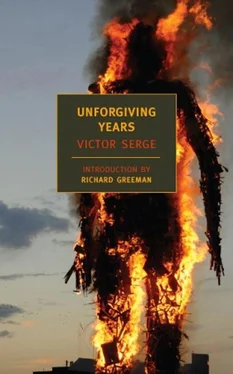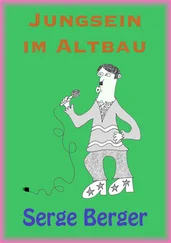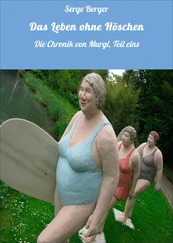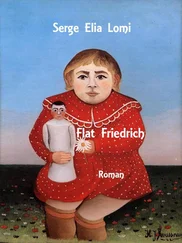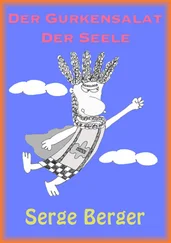On the roads around Samarkand you would ride buses much like this one. Now discolored by dirt, scratches, and dents, it had once been blue. The skins of the men and women who traveled in it were bronzed, burned, golden, coppery, ashen, mirroring the hues of sun-soaked boulders and composted earth, revealing the mix of bloods. The taciturn watchfulness of their eyes, the power of their muscles, their human indigence approached the animal — as did their natural nobility. Their antique Asian faces were pleas-ant — more closed than pleasant. Silver crosses on strands of coral beads hung over white embroidered blouses (loose blouses, similar to the smocks worn by Komi women in the upper Volga…). The driver was a frizzy-headed, negroid athlete dressed in a pink shirt; an image of the Virgin and a profusion of ex-votos composed of nuts and miniature revolvers filled most of his visual field. Instead of forty passengers, the heroic rattletrap took on seventy, plus their hens, turkeys, cats, and a fighting cock. A brown child slept in Daria’s lap; beside her the mother suckling an infant, her swollen breasts as matt as sunbaked clay; she must have been about fif-teen, and crossed herself at every pothole like an old woman. So much sweaty flesh, soiled whiteness, patient breathing, and resignation filled the bus that Daria saw little of the ruddy incandescence of the countryside… “San Blas!” The frizzy-haired driver helped two passengers down, a centenarian native woman and the foreigner. The engine hiccupped once and the bus was gone. Balancing her baskets, the old Indian woman was already climbing the slope, following an invisible path between outcrops singed with rust; her bare feet gripping the stones like a faun’s. She plodded steadily on, bent double, toward a bare, gray summit under the reddening sky. When she vanished between the boulders, the solitude was for a moment total.
“Journey’s end,” thought Daria.
She also thought of snakes: of the graceful snakes that must lie coiled everywhere unseen in the rocky wilderness, of the huge stylized serpents of these people’s ancient art, of serpents of fire, serpents of night.
All of a sudden two dark children dressed in white rags materialized in front of her. They pounced on her suitcase. One said, “To Don Gamelindo’s,” since clearly the stranger could be going nowhere else along this stony path, indiscernible at first, then lined with wild nopals, bristling with thorns, pathetically twisted… The path forked toward tumbledown walls. And Don Game-lindo’s store appeared in the corner of a small rustic plaza: arcades, tall trees outlined against the sunset, baroque church set apart on a crest overlooking the lake… Daria had no time to appreciate all of it, so quickly did the night come down. An electric bulb cast a desiccated glare across the store. The counter, the ropes, the candles, the piles of shoes, the rolls of cloth, the bottles were immersed in emptiness and silence… The dark eyes of a thin-necked nocturnal child peered out from beneath tangled hair but said nothing. They seemed to be the eyes of motionless things. Don Gamelindo appeared at Daria’s back, seemingly from nowhere. He moved without making a sound. “ Buenas noches , what do you want?” Thickset, unshaven, in shirtsleeves and waistcoat, with a paunch sagging over his belt and a holster on his hip. His complexion was pale, his small greenish eyes shifted watchfully between puffy lids. Daria explained that she was looking for the plantation of Don Bruno Battisti. Even as she spoke, she felt a sensation of total uselessness. Nothing could exist for her here: no past, no present, no continuity and no tomorrow, no questions and no answers. She herself would cease to exist in the eyes of anything that might be knowable. She nearly said, dreamily, “Where are the snakes?” A hostile land, sharp rocks, aggressive plants, oppressive silence, a night for a disappearance. Don Gamelindo answered, “Yes, La Huerta.”
As he studied her — if indeed he was taking the trouble to study her — he seemed to be waiting for the silence to complete its work of destruction.
“But you can’t go to La Huerta tonight. You must spend the night in San Blas.”
“Where?”
“At my place.”
He barricaded the street door. A raw smell of tanned hides filled the air. Don Gamelindo’s hairy pink hand protected a candle from the dead breeze. They crossed a large, dark courtyard under a ceiling of stars. “In there.” Daria obeyed, like a prisoner. She ducked into a whitewashed room containing a prisoner’s pallet, a stool, an earthenware jug, and an altar to the Virgin where he placed the candle. The door of disjointed planks was secured only by a hook and a nail. The candle shed an amazing light.
“No danger at my house,” said Don Gamelindo. “Sleep well. God protect you.”
As he left, he added, ceremoniously: “Don Bruno is my friend. I’ll take you to him tomorrow.”
His friend? Sacha, the man of ardent ideals — what a strange friend for him to have! “Thank you,” said Daria. “Good night.”
She was not offered anything to eat. She drank some cool water from the jug and walked around the yard. The ocean of constellations sparkled sharply. Shooting stars darted between immobile stars. The Milky Way lay like a blurred serpent across the heavens. A murmur rose from the lake, the croaking of toads grew louder, coyotes howled intermittently in the distance. The complaint of silence. Suddenly Daria was faced with a shadowy beast — hairy, bulky, humble. A tiny speck of light, like a fixed star of infinitesimal size, pinpointed the mule’s eye. Comforting presence… Daria rubbed her fist over its warm withers.
“Well, well,” she said to herself, “here we are, saved; here we are, completely lost…”
Almost the same silence as in Kazakhstan, and almost the same firmament; but Daria recognized none of the constellations.
“All the pages of life are torn out…” The fullness of the night remained.
* * *
Out early into the yard, Daria renewed contact with a splendidly simple world. Purple sprays of bougainvillea poured over the broken walls. A thicket of menacing nopals — fleshy green — bristled vehemently, and they bore bulbous flowers of a delicate red. A yellow campanile rose above its surround of tall trees, hairy with creepers trailing from every branch. The brightness of the morning was expanding into a vivid symphony of color that promised to intensify almost beyond endurance after this hour of exquisite softness. A monumental joy — not of living, more primordial than that; of existing — conjoined earth and sky in the embrace of the light. Naked toddlers with bulging bellies scattered at the sight of the foreigner brushing her hair at the door of her room.
Don Gamelindo was a different man by day. “Can you ride a horse?” “Oh yes…” Now he seemed reduced to a pair of stumpy legs supporting a disproportionate stomach, with the aid of a belt pulled up from his crotch to his hips. On his holster was incised the round face of the Aztec sun god, with forked tongue stuck out. On his head was a tall white conical hat worn horizontally just over his eyes. His small features, modeled out of the rosy clay of his flesh, were marred by countless small pockmarks. He was laughing to himself, exposing rotten teeth; a friendly effusiveness animated his sly green eyes without relaxing their vigilance. Daria realized that he found her attractive, as had Don Saturnino. “¡ Gracias a Dios todopoderoso ! Thanks to God Almighty!” he said, thanking the Creator for this morning’s welcome distraction.
Once or twice a year, female American tourists drove up to San Blas in their heavy motorcars, flounced into the store, asked for Coca-Cola, refused to drink from glasses that had been washed in the pure water of the well, drank out of silly paper cups. How stuck-up those fair-haired women were, like their well-groomed dogs who warily sniffed our half-coyote mongrels — so reliable in dangerous situations — from a cautious distance. Don Gamelindo quadrupled his prices. The tourists snapped their cameras at the church, the naked children, the view over the lake… The women’s tight slacks flattered their rumps indecently, so that the village elders were of two minds about allowing these women dressed as men into the church. A wise man carried the day (in favor, there being dollars at stake) with the argument that “since trousers on a woman is the Devil’s doing, let it be the Devil’s business to roast her in the next world.” (All the same, the equestrian statue of St. James the Sword-bearer was kept covered up in the presence of slacks, for he is easily piqued and quite capable of retaliating with a wave of drought or smallpox…) How different was this woman, in her sandals, plain black skirt, white top, and broad-brimmed Indian hat; how different her muscular arms and erect carriage, her face, still young but aging already; the calm severity of that face! Don Gamelindo guessed that she was unlikely to believe in God (may He forgive her), was not especially rich, and had known many men without becoming soiled; some women are like that, like horses caked in lather and the dust of the road, who emerge from the lake cleansed, so noble of form, so glowing with sunshine that you feel proud of them and proud of yourself.
Читать дальше
